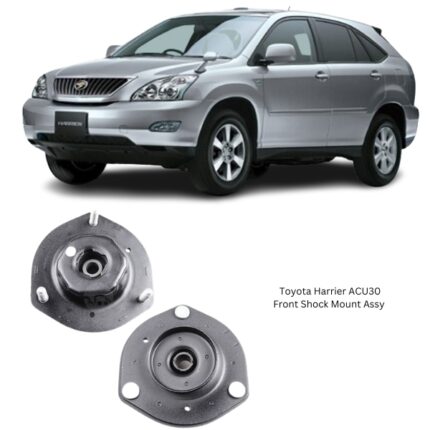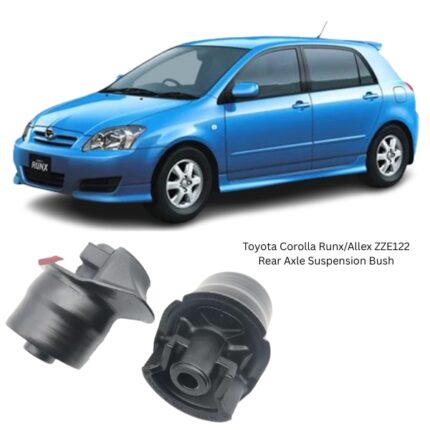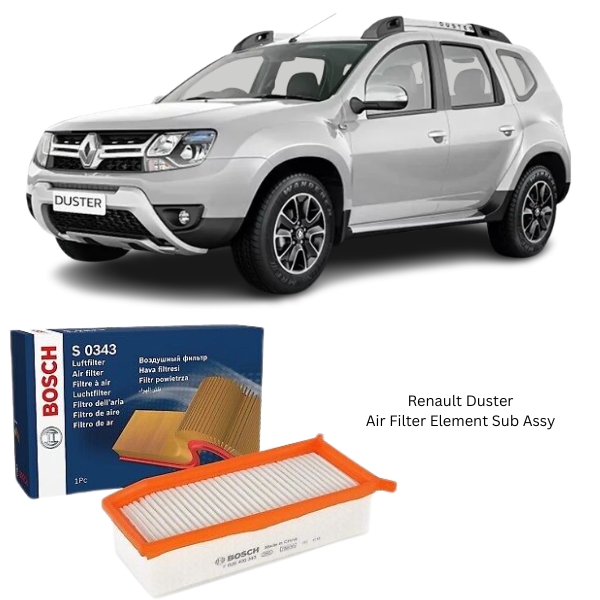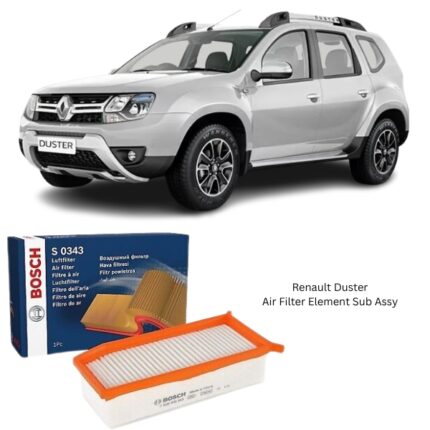-12%
Get Renault Duster Air Filter Element Sub Assy F026400343 in Kenya
The Air Filter Element Sub-Assembly is a vital component within the vehicle’s engine air intake system. Its primary function is to filter the air entering the combustion chamber by removing dust, debris, and other airborne contaminants. Clean air is essential for optimal combustion, engine performance, fuel efficiency, and emissions control. The air filter element—often housed within a sealed air box—acts as the first line of defense between the environment and the engine.
Overlooking the condition of this component can lead to reduced engine performance, increased fuel consumption, premature engine wear, and even failure of emission control systems. Designed for durability, high filtration efficiency, and low airflow resistance, the air filter element sub-assembly ensures that only clean, filtered air reaches the engine intake manifold.
Function and Importance
The Air Filter Element Sub-Assy serves several core purposes in the operation of a vehicle’s engine:
-
Contaminant Removal
Removes dust, sand, soot, pollen, and micro-particulates from the intake air to prevent internal engine abrasion. -
Airflow Regulation
Controls the volume and direction of air flowing into the engine for optimal air-fuel ratio and efficient combustion. -
Performance Optimization
Ensures that the engine breathes clean air without restriction, helping maintain power output and throttle response. -
Fuel Efficiency Support
Clean air improves the combustion process, reducing unburned fuel and helping optimize fuel usage. -
Emissions Control
Prevents contaminants from affecting sensors and systems such as the Mass Air Flow (MAF) sensor, catalytic converter, and EGR system. -
Engine Longevity
Reduces long-term engine wear by preventing foreign particles from entering the combustion chamber or damaging internal components like pistons, valves, and cylinder walls.
In summary, the air filter is a key factor in maintaining both short-term performance and long-term engine durability.
Design and Construction
The air filter element is built to withstand constant exposure to air turbulence, dust, humidity, and temperature changes under the hood. It is engineered with both filtration precision and airflow efficiency in mind.
Core Construction Elements:
-
Filter Media
The central component is the filter media, typically made from pleated cellulose (paper), synthetic fiber, non-woven fabric, or foam. These materials trap airborne contaminants without overly restricting airflow. -
Pleated Design
The media is pleated to maximize surface area within a compact volume, increasing dirt-holding capacity and service life. -
Rubber or Polyurethane Gasket Frame
A soft, flexible gasket forms an airtight seal against the air filter housing, preventing unfiltered air from bypassing the element. -
Mesh Reinforcement (optional)
Some designs feature metal or plastic mesh to support the pleated media and resist collapse under pressure. -
End Caps / Edge Protection
The ends of the pleats are sealed with urethane caps or bonded frames that keep the structure intact under varying conditions. -
Shape and Fitment Options
Available in panel, cylindrical, conical, or oval shapes, depending on the intake system’s design.
The materials are selected to resist humidity, temperature shifts, and exposure to contaminants while maintaining structural integrity over thousands of operating kilometers.
Performance Characteristics
The air filter element is designed to balance filtration efficiency and airflow performance, ensuring clean air supply without impeding engine breathing.
Key Performance Metrics:
-
Filtration Efficiency
Capable of filtering out 98–99.9% of airborne particles as small as 5–10 microns. -
Dirt-Holding Capacity
Designed to trap a significant volume of dirt before airflow becomes restricted, ensuring long service intervals. -
Low Airflow Resistance
Minimizes pressure drop across the filter media, maintaining optimal intake air volume and engine performance. -
Temperature Stability
Performs reliably in environments with temperatures ranging from below freezing to over 100°C. -
Moisture and Oil Resistance
Withstands water vapor and occasional exposure to oil vapors from the crankcase ventilation system. -
Long Service Life
Typically rated for 10,000 to 30,000 kilometers depending on driving conditions and filter design.
These characteristics make the air filter a crucial performance part in both urban and off-road driving scenarios.
Symptoms of a Clogged or Worn Air Filter
A dirty or damaged air filter element can lead to several noticeable symptoms:
-
Reduced Engine Power
Restricted airflow may lead to sluggish throttle response and lack of acceleration. -
Increased Fuel Consumption
The engine compensates for low airflow by adjusting the fuel mixture, often leading to higher fuel usage. -
Unstable Engine Idle
Poor airflow regulation can lead to rough or uneven idling. -
Dirty Intake Components
A torn or bypassed filter allows dirt into the intake manifold, visible during inspection. -
Engine Warning Lights
Contaminants on MAF or oxygen sensors can trigger error codes or dashboard warning lights. -
Black Smoke from Exhaust
Rich fuel mixture from insufficient air intake may result in excessive exhaust emissions. -
Unusual Engine Noises
A hissing or whistling noise may occur due to restricted air passage or collapsed filter material.
Regular inspection and timely replacement of the filter help avoid these issues.
Installation Guidelines
Installing a new air filter element is a straightforward process but must be done carefully to maintain air-tight integrity.
Basic Installation Steps:
-
Access the Air Filter Housing
Unlatch or unscrew the housing cover to expose the old filter element. -
Remove the Old Filter
Inspect it for visible dirt, damage, or collapsed media. -
Clean the Housing
Use a dry cloth or vacuum to remove dust and debris inside the air box. -
Insert the New Filter Element
Align the filter properly and ensure the gasket creates a complete seal. -
Reassemble the Housing
Secure all clamps, bolts, or covers to prevent air leaks.
Caution: Avoid installing the filter backwards or using lubricants, as they may damage sensors downstream.
Maintenance and Service Intervals
Air filters should be inspected during every routine service and replaced based on:
-
Manufacturer Recommendations
Typically every 10,000 to 20,000 km, or more frequently in dusty environments. -
Driving Conditions
Short trips, heavy traffic, off-road use, or high pollution zones may require more frequent replacement. -
Visual Condition
Replace if the pleats appear black, collapsed, or excessively dusty.
Keeping the air filter clean is one of the most cost-effective ways to protect your engine and maintain efficiency.
Benefits of a Clean, High-Quality Air Filter Element
-
Improved Engine Performance
Enables consistent airflow for combustion, enhancing horsepower and response. -
Better Fuel Economy
Promotes efficient fuel-air mixing, reducing consumption. -
Reduced Emissions
Prevents unburned fuel and carbon buildup, supporting cleaner exhaust. -
Longer Engine Life
Stops abrasive particles from causing internal damage. -
Reliable Sensor Operation
Maintains clean airflow to sensitive components like the MAF sensor. -
Low Maintenance Cost
Easy to replace and inexpensive relative to its protective value.
Follow us on Facebook for more parts.





Reviews
Clear filtersThere are no reviews yet.